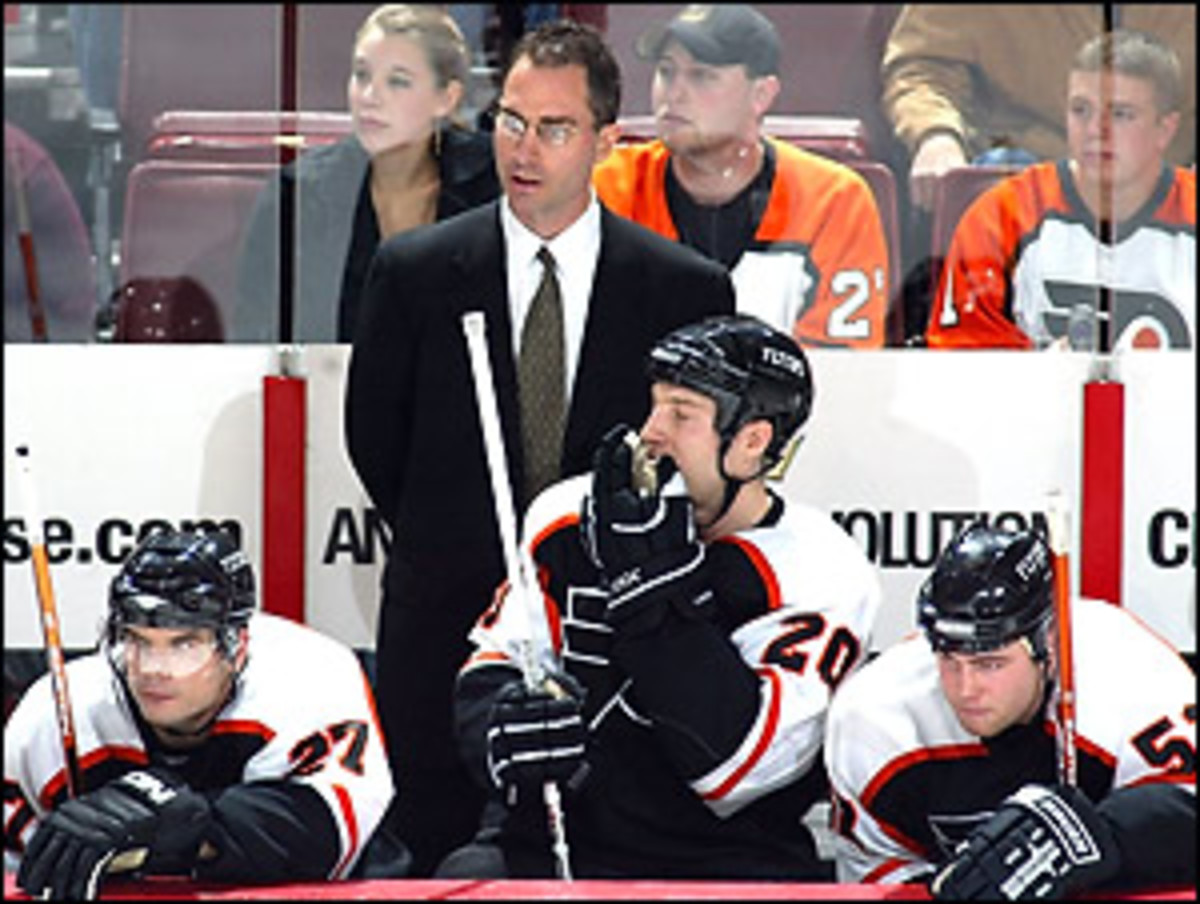Tale of two cities
You've heard it before: the best moves are sometimes the ones that a team's management doesn't make.
And so we have a tale of two cities -- Philadelphia and Phoenix -- that are heading in opposite directions.
Return with us now to Oct. 24, 2006. The Flyers, having played six of their first eight games on the road, have stumbled to a 1-6-1 start. They'd finished the previous season with 101 points, 45-26-11, and everyone has predicted in preseason polls that the Flyers would make the playoffs.
Suddenly, the team is in disarray. GM Bobby Clarke, three games into the young season, has resigned, saying his heart was no longer in the job. The Flyers have been outscored 15-33; their worst loss a 9-1 embarrassment at the hands of the Sabres. They can't score. Their goaltending stinks. Something has to be done. But what?
Meanwhile, three time zones away, the Coyotes are on a similar path. The record? 2-8-0. The prognosis? Bleak.
Like the Flyers, the Coyotes have had poor goaltending, they've been outscored 19-44, and they've been embarrassed 9-2 by a good team: the Red Wings. Unlike the Flyers, though, no one believed the Coyotes, who were coming off a last-place finish in the strong Pacific Division, were going to make the playoffs. But few people thought they'd be this bad.
What transpired? The Flyers' front office panicked. The Coyotes' front office kept their heads. Philly owner Ed Snider stepped into the void left by Clarke's resignation and, against Clarke's counsel, fired head coach Ken Hitchcock, a man who'd never had a losing season in 10 years behind an NHL bench. Snider replaced him with John Stevens, who'd never been an NHL head coach, but at least he'd had success in the minor leagues.
Result? Ten weeks later, the Flyers are the worst team in the league, with a record of 11-27-4. They've gone from five games under .500 to 16 games under, with absolutely no chance of making the playoffs and no dawn on the horizon.
They're even getting worse. The young players on the team are getting steeped in a culture of losing, and veterans like Peter Forsberg are hoping to get dealt out of town before the trading deadline. And Hitchcock? As I predicted in a previous column, he's landed on his feet in Columbus, where he's turned around a Blue Jackets team that was 5-13-2 before he arrived and 11-9-2 afterwards.
I have zero doubt that Hitchcock would have turned the Flyers around, as well. The moral of this part of the tale? Eight games does not make a season. Never underestimate the resilience and importance of a great coach.
And the Coyotes? Guess who's the hottest team in the Western Conference, with a 7-2-1 record in its last 10 games as of Monday?
Yep. Phoenix turned their ship around without changing captains. The second-year coach, Wayne Gretzky, also happens to be the club's managing partner. No way he was leaving unless he resigned. And the thing that Gretzky the player and Gretzky the coach have in common is that they're both patient and decisive, without an iota of quit. Gretzky hates losing, the players respect him, and he's smart.
The Coyotes general manager is Gretzky's long-time agent, Mike Barnett. Instead of panicking, the two started moving players to the minors who didn't fit. Recognizing the need for more scoring, Barnett signed veteran Yanic Perreault to a free agent contract on Oct. 29, and Perreault now leads the team in goals with 13.
Gretzky benched underperforming veteran Jeremy Roenick until Roenick changed his attitude. Seeing that veteran netminder Curtis Joseph needed help, Barnett traded for backup Mikael Tellqvist, who was third on the depth chart in Toronto. Since arriving on Nov. 28, Tellqvist is 6-0-2, with a .910 save percentage and 2.71 GAA. Those are better numbers than Joseph's (11-4, .895, 3.12), but he has responded with improved play and a couple of shutouts since Tellqvist's arrival.
Change didn't happen overnight. It seldom does. The key was that Gretzky kept his players motivated and positive, preventing a culture of losing from setting in as the pieces were being assembled. Ed Jovanovski, a free-agent acquisition last summer who was supposed to stabilize the defense, began to do just that.
By Thanksgiving, Phoenix was no longer hemorrhaging wins, but they were still eight games under .500. They were seven games under .500 at Christmas. Then something clicked, and the Coyotes started to win. It started with back-to-back victories over the strong San Jose Sharks, division rivals, including an 8-0 blowout.
The talent gap in the new NHL isn't that dramatic. A team's success depends so much on goaltending, special teams and confidence. Suddenly, the Coyotes had a jolt of all three. Feeding off those successes, they went on the road on January 1, and have won four straight away games going into Tuesday's contest in Dallas. That gives Phoenix six straight wins for the first time since March 2002.
The Coyotes are now a respectable 19-20-2 overall, just five points away from a playoff spot, standing 11th in the conferenc overall. Nor is Barnett done dealing. He's added defensive forward Kevyn Adams, helped the Carolina Hurricanes win the Stanley Cup last season. That's how you breed a culture of winning.
Time will, of course, tell if the Coyotes can keep it up. But a season on the brink has been salvaged. Phoenix fans should be excited by what's going on there -- on the ice, behind the bench and in the front office.
In Philadelphia, it's the opposite story. Panic by management. It was real. It was deadly. And it can ruin a franchise for years.






